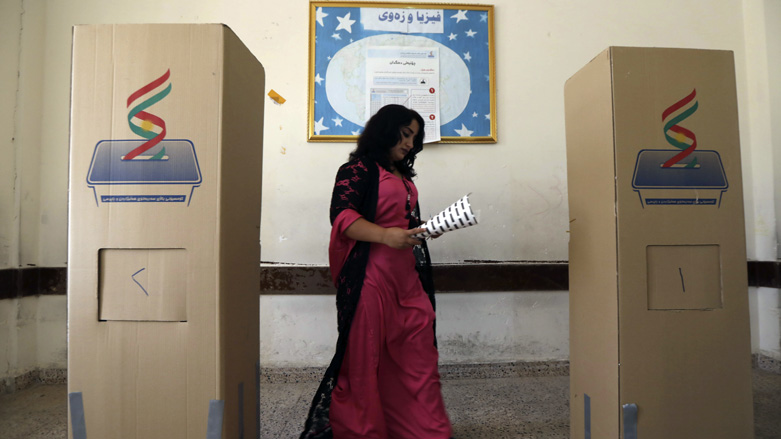LIVE: Polls officially close for Kurdistan Region parliamentary election

*****
9:50 p.m.
Latest and official voter turnout in the Kurdistan Region's four provinces for the parliamentary elections:
Duhok: 61.87 percent
Halabja: 60.90
Erbil: 58.58
Sulaimani: 53.01
Total: 57.23
*****
8:45 p.m.
Initial voter turnout in the Kurdistan Region's four provinces for the parliamentary elections:
Duhok: 61.9 percent
Halabja: 60.9
Erbil: 58.8
Sulaimani: 43
*****
7 p.m.
PUK spokesperson Pira tells Kurdistan 24 he retracts his previous remarks.
*****
6:08 p.m
KRSC Chancellor Masour Barzani congratulated voters who turned out "to write the next chapter of Kurdistan's journey," and thanked the security services for allowing voters "to exercise their rights and a peaceful conduct of the election process."
*****
6:05 p.m.
The Patriotic Union of Kurdistan's (PUK) spokesperson Saadi Ahmed Pira told reporters his party was rejecting the results of Sunday's Kurdistan Region parliamentary elections, alleging fraud.
*****
6 p.m.
The Kurdistan Region's Elections Commission has announced the closure of polling stations for the parliamentary elections.
*****
1:03 p.m.
The head of the United Nations Assistance Mission for Iraq (UNAMI) Jan Kubis said in a press conference held in Erbil that the UN team is overseeing the parliamentary election in different provinces of the Kurdistan Region.
"The voting is well-organized and the electoral staff is fully aware of the procedures and they enforce it to be followed by the voters."
He also called on eligible voters to go to polling stations to vote for their representatives, and he hoped that there would be a high turnout.
*****
10:41 a.m.
The head of the United Nations Assistance Mission for Iraq (UNAMI) Jan Kubis calls the people of the Kurdistan Region to use the opportunity to voice their position, noting "there is strong participation in this election and the process is very orderly, well-organized."
*****
9:47 a.m.
Kosrat Rasool Ali, First Deputy for the Secretary General of the PUK, casts his ballot for the 2018 parliamentary election.
*****
9:35 a.m.
Opposition leader, Omar Said Ali of Gorran (Change), casts his vote in Sulaimani, stating the electoral commission is "independent and I hope it maintains its impartiality."
*****
9:20 a.m.
Chancellor of the Kurdistan Region Security Council (KRSC) Masrour Barzani casts his ballot in the parliamentary election, stressing "the success of this [electoral] process will ensure the success of the Kurdistan Region."
"The important takeaway from today’s election is the lasting victory for Kurdistan’s democratic process. I hope the election will be a fair and orderly process, and I urge all parties to respect the will of the people for the winning part."
*****
9:02 a.m.
Former President of the Kurdistan Region and current KDP leader Masoud Barzani casts his ballot for the 2018 parliamentary election.
"The people of the Kurdistan Region will decide how much [weight] each party should have, but that does not mean parties do not need each other after the election."
*****
8:32 a.m.
Deputy Prime Minister of the Kurdistan Region Qubad Talabani casts his ballot in Sulaimani for the parliamentary election, stating parties in the Kurdistan Region should be able to accept their differences.
*****
8:18 a.m.
Prime Minister of the Kurdistan Region Nechirvan Barzani calls on all eligible voters in the Kurdistan Region to cast their ballot in the parliamentary election and exercise their democratic right.
*****
8:05 a.m.
Prime Minister of the Kurdistan Region and deputy head of the leading Kurdistan Democratic Party (KDP), Nechirvan Barzani, casts his vote in Erbil
*****
8 a.m.
The Kurdistan Region’s parliamentary election kicked off on Sunday morning for over three million voters, the first regional elections since the defeat of the Islamic State (IS).
According to the Independent High Electoral and Referendum Commission (IHERC), 773 candidates from 29 political parties will compete for a seat in the 111-seat parliament in the semi-autonomous region.
Just over half of the Kurdistan Region’s population of almost six million people are eligible to vote.
From the total 3,085,461 registered voters, 39 percent are from Sulaimani province, 36 percent from Erbil, 23 percent from Duhok, and two percent from the recently established Halabja governorate.
Voters will cast ballots at one of the 5,941 local voting centers where their names are registered.
Unlike Iraq’s widely-disputed national election in May which relied on electronic vote-counting devices, the Kurdistan Region will count all ballots manually to quell concerns any party may have about potential vote-rigging, election tampering, or other fraudulent acts.
A new regulation also stipulates that the commission take close-up photographs of each voter before they cast their ballots.
The Kurdistan Region’s election comes almost five months after the parliamentary vote across Iraq on May 12.
It is also the first regional elections in Kurdistan since IS’ defeat last December.
Following the emergence of the extremist group in 2014, Kurdish Peshmerga forces were heavily invested in defeating IS and liberating areas the militants controlled.
Over 1,800 Peshmerga and Kurdish security members gave their lives, and about 12,000 more were wounded, according to statistics from the Peshmerga Ministry.
